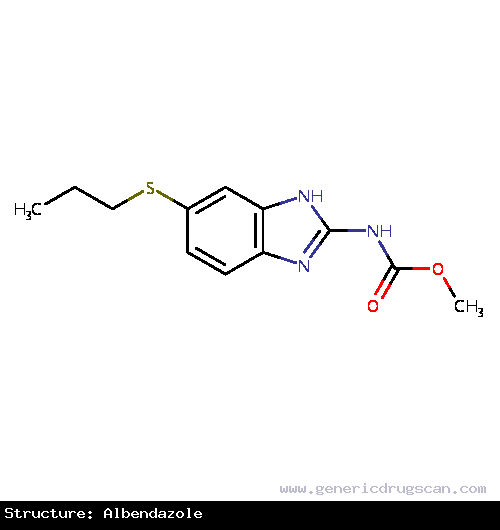Albendazole Drug: Indication, Dosage, Precaution, Side Effect , Storage, Category Type and corresponding Brands - www.genericdrugscan.com
Albendazole
Drug Status in USA : Approvedpronunciation
pronounced as (al ben' da zole)
Why is this medication prescribed?
Albendazole is used to treat neurocysticercosis (infection caused by the pork tapeworm in the muscles, brain, and eyes that may cause seizures, brain swelling, and vision problems). Albendazole is also used along with surgery to treat cystic hydatid disease (infection caused by the dog tapeworm in the liver, lung, and lining of the abdomen that may damage these organs). Albendazole is in a class of medications called antihelmintics. It works by killing the worms.
How should this medicine be used?
Albendazole comes as a tablet to take by mouth. It is usually taken with food twice a day. When albendazole is used to treat neurocysticercosis, it is usually taken for 8 to 30 days. When albendazole is used to treat cystic hydatid disease, it is usually taken for 28 days, followed by a 14-day break, and repeated for a total of three cycles. Take albendazole at around the same times every day. Follow the directions on your prescription label carefully, and ask your doctor or pharmacist to explain any part you do not understand. Take albendazole exactly as directed. Do not take more or less of it or take it more often than prescribed by your doctor.
If you are giving the medication to a child or if you cannot swallow the tablets whole, you may crush or chew the tablets and swallow with a drink of water.
Take albendazole until you finish the prescription, even if you feel better. If you stop taking albendazole too soon or skip doses, your infection may not be completely treated.
What are the precautions to be followed?
Before taking albendazole,- tell your doctor and pharmacist if you are allergic to albendazole, mebendazole, any other medications, or any of the ingredients in albendazole tablets. Ask your pharmacist for a list of the ingredients.
- tell your doctor and pharmacist what other prescription and nonprescription medications, vitamins, nutritional supplements, and herbal products you are taking or plan to take. Be sure to mention theophylline. Your doctor may need to change the doses of your medications or monitor you carefully for side effects.
- tell your doctor if you have or have ever had liver disease.
- tell your doctor if you are pregnant, could be pregnant, or plan to become pregnant. You should not begin your treatment with albendazole until you have taken a pregnancy test with negative results. You should not become pregnant while you are taking albendazole and for at least one month after finishing your treatment. Talk to your doctor about birth control methods that you can use during your treatment. If you become pregnant while taking albendazole, call your doctor immediately. Albendazole may harm the fetus.
- tell your doctor if you are breast-feeding.
- if you are having surgery, including dental surgery, tell the doctor or dentist that you are taking albendazole.
- if you are taking albendazole to treat neurocysticercosis, your doctor will probably tell you to take certain medications to prevent damage to the nervous system during your treatment. Call your doctor right away if you have any of the following symptoms: seizures, headache, vomiting,extreme tiredness, or changes in behavior.
What are possible side effects of this medication ?
Albendazole may cause side effects. Tell your doctor if any of these symptoms are severe or do not go away:- stomach pain
- nausea
- vomiting
- headache
- dizziness
- reversible hair loss
- sore throat, fever, chills, and other signs of infection
- unusual bleeding or bruising
- weakness
- fatigue
- pale skin
- shortness of breath
- rash
- hives
Albendazole may cause other side effects. Call your doctor if you have any unusual problems while taking this medication.
How to store the medication and dispose it of after its use later?
Keep this medication in the container it came in, tightly closed, and out of reach of children. Store it at room temperature and away from excess heat and moisture (not in the bathroom). Throw away any medication that is outdated or no longer needed. Talk to your pharmacist about the proper disposal of your medication.
Drug Category/Class
- Benzimidazole Derivatives
- Antinematodal Agents
- Anthelmintics
- Antiparasitic Products, Insecticides and Repellents
- Benzimidazoles and Related Substances
- Antiprotozoal Agents
- Tubulin Modulators
- Anticestodal Agents
- Cytochrome P-450 CYP1A2 Inhibitors
- Cytochrome P-450 CYP1A2 Inducers
- CYP3A4 Inhibitors
- Benzimidazole derivatives
| Prescribed | For the treatment of parenchymal neurocysticercosis due to active lesions caused by larval forms of the pork tapeworm, Taenia solium and for... |
| Weight : | 265.331 |
| Structure | Albendazole |
 | |
| Formula | C12H15N3O2S |
Albendazole has 597 Brands listed
Search Generic Drugs alphabetically
